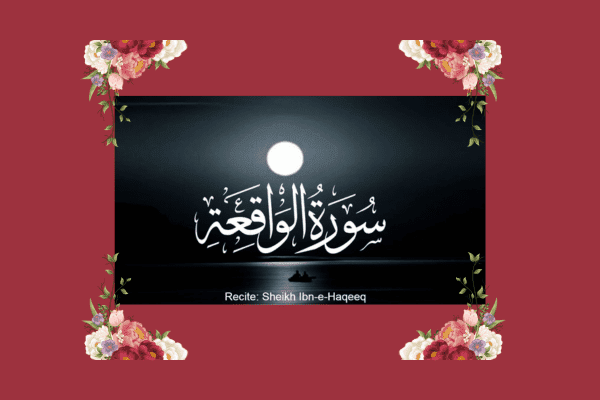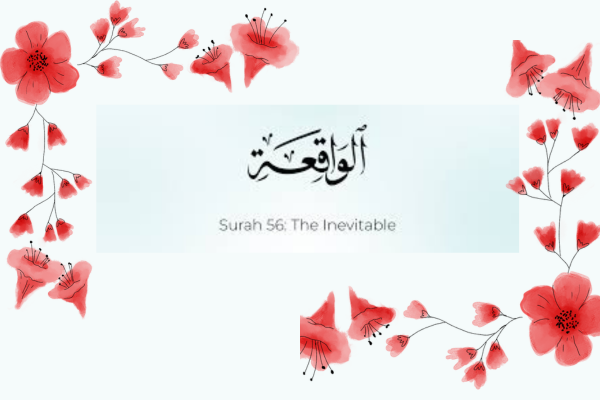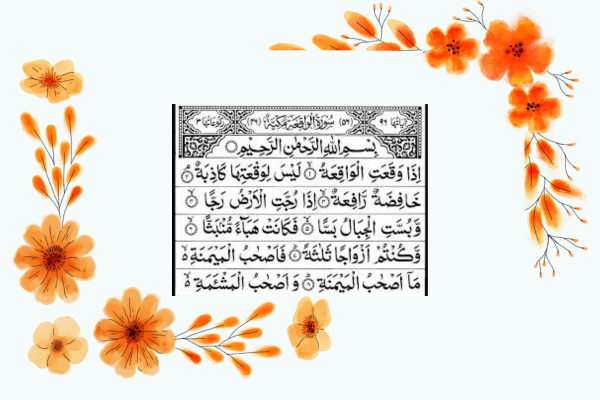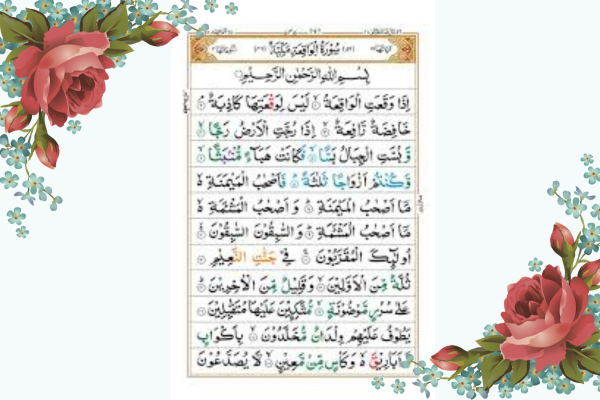


Surah Al-Waqi’ah (chapter 56) One of the most insightful chapters in the Quran is (chapter 56), which has 96 verses (ayahs). It is categorised as a Meccan surah, which indicates that it was revealed before to the Prophet Muhammad’s (PBUH) relocation to Medina, in the early stages of his prophetic career. The Arabic word “Waqi’ah,” which means “The Event” or “The Inevitable,” is whence the surah gets its name. It alludes to the Day of Judgement and the events leading up to the ultimate reckoning.

Key Messages and Themes
- The certainty of judgement day
A detailed description of the Day of Judgement opens the surah. Allah emphasises that there will be no question regarding “the inevitable event” (Al-Waqi’ah) when it occurs. Unfathomably dramatic changes will occur in the universe; the ground will tremble, mountains will fall, and Allah’s wrath will be felt across creation. This topic encourages believers to get ready for everlasting life by serving as a reminder of the transient nature of this world and the certainty of the hereafter.

Humanity’s Classification
Surah Waqiah With Urdu Translation | Para: 27 | Al Sudais | Urdu by Fateh Muhammad Jalandhari
Allah divides people into three categories in the surah’s second section:
The Foremost (As-Sabiqun): These are the most virtuous, who excel in good acts and are closest to Allah. They are assured of an eternally happy life in the paradise gardens. This group is referred to as the first in faith and dedication, the elite of the elite.
The pious people who lived their lives in faith and obedience to Allah make up the Companions of the Right Hand (Ashab al-Yamin). They receive a paradise brimming with blessings and joys as payment.
Ashab al-Shimal’s Companions of the Left Hand: These are the people who disregarded faith, committed immoral deeds, and turned away.
Humanity’s divide serves as a stark reminder of the value of moral behaviour, religion, and the effects of our decisions. It is a potent reminder that what we do now has actual consequences down the road.
The Graces of the Universe
Allah highlights the natural occurrences that occur in the world, like the development of crops, the falling of rain, and the usage of fire for warmth and food. Allah poses rhetorical questions through these instances, challenging people to consider who bestows these bounties and to acknowledge Allah’s omnipotence. The surah serves as a reminder to believers of the value of appreciation and recognition of Allah’s boundless blessings by showcasing the intricate details and beauty of the natural world.
The Death and Resurrection Realities
The surah also focuses on the realities of death and resurrection. Allah reminds people that He alone is the source of both life and death. Nobody can stop someone who is about to pass away, and no person can make death go backwards. The idea of resurrection is very important since Allah makes it very evident that people will be raised from the dead and held responsible for their actions.
Spiritual and Moral Teachings
Responsibility for Deeds
The idea of personal accountability is one of the most important lessons to be learned from Surah Al-Waqi’ah. Every person will be assessed according to their actions, both good and negative. The surah exhorts believers to live virtuously, emphasising actions that will help them in the hereafter.
Gratitude and Obedience to Allah
Surah Al-Waqi’ah serves as a reminder of both the might of Allah and human limits.
The Value of Being Appreciative
The surah exhorts believers to express gratitude for their gifts and sustenance by highlighting the blessings that Allah has bestowed. A person’s relationship with their Creator is strengthened when they acknowledge Allah’s favours, and gratitude is a fundamental aspect of faith.
Getting Ready for the Afterlife
The surah underscores the idea that life is fleeting and that true life begins at death. This encourages believers to concentrate on doing good deeds, doing acts of worship, and living a life that complies with Islamic principles in order to get ready for the hereafter.
Relationship to Other Surahs
Because of its spiritual and philosophical topics, Surah Al-Waqi’ah is frequently repeated. It is related to other surahs that address the afterlife, such Surah Al-Mulk and Surah Al-Qiyamah. The Day of Judgement is a reoccurring topic that reminds believers to always be aware of their purpose in life and their impending meeting with Allah.
In summary
A potent chapter in the Quran, Surah Al-Waqi’ah paints a vivid picture of the Day of Judgement, the destiny of various people groupings, and the blessings of Allah’s creation. It provides insightful teachings on responsibility, thankfulness, and the significance of living a moral life to get ready for the hereafter. It serves as a source of spiritual inspiration for believers, inspiring them to consider their deeds and their relationship with their Creator.
